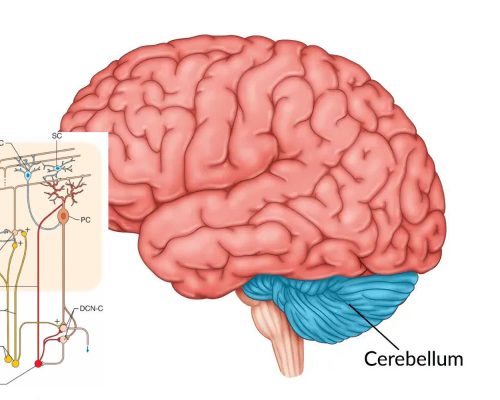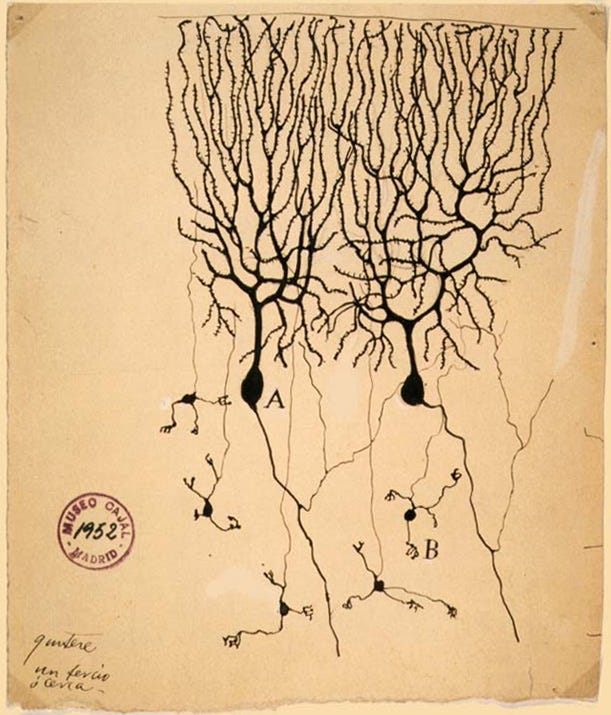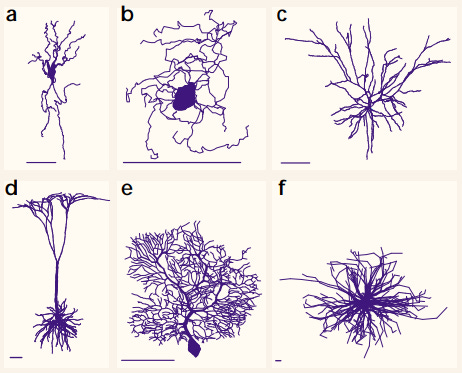
What does the Cerebellum Do Anyway?.
by Sarah Constantin, December 28, 2023
Thanks to Paul Wirth of mosaicbodywork.com, who suggested this article
This [above] is the cerebellum. Its name means “little brain”—it’s a whole other brain under your “big” one.
If you vaguely remember something about what the cerebellum does, you’re probably thinking something to do with balance. Medical students have to learn the “cerebellar gait” that results from cerebellar injury (it’s the same staggering gait that drunk people have, because alcohol impairs the cerebellum.)
A more detailed neurological exam of a patient with cerebellar disease shows a wider variety of motor problems.
Here you’ll notice that the patient can’t bring his finger to his nose or clap his hands without a wobbling back-and-forth motion; that his eyes “wobble” back and forth (which is called nystagmus); and that he wobbles backwards and forwards while standing or walking, so that he nearly falls over and needs a broad-based gait to support himself.
In cerebellar disease, muscle tone is diminished (people are “floppy”), movements are not fluent (each individual sub-movement is separate), there’s dysmetria (failure to “aim” or estimate the distance to move, overshoot or undershoot) and there’s “intention tremor” (high amplitude, relatively slow wobbles that arise when the patient starts to move, as contrasted with the “resting tremor” characteristic of e.g. Parkinson’s disease.)
Clearly, the cerebellum does something to control movement, and movement is impaired when it is damaged. But why do we need a whole other “little brain” to control these aspects of movement?
There are already regions of the cerebrum (or “forebrain”) dedicated to movement, like the motor cortex and the basal ganglia. And you can do a lot of movement using just those!
Even in the rare cases known as cerebellar agenesis, where a person is born totally lacking a cerebellum, movement is still possible, just impaired: slow motor and speech development in childhood, abnormal spoken pronunciation, wobbly limb movements, and mild-to-moderate intellectual disability. But not paralysis, and not even particularly bad disability overall — a lot of these people were able to live independently and work at jobs.
So…that’s weird.
What is the cerebellum’s job? It seems weird to have a whole separate organ for “make motor and cognitive skills work somewhat better.”
The other weird thing about the cerebellum is anatomical.
These very large, complex neurons are the Purkinje cells, which exist only in the cerebellum.


They have hundreds of synapses each, unlike the neurons of the cerebrum which only have a few.
Most of the other cells in the cerebellum are the small granule cells — in fact, they are so numerous that they comprise more than half of all neurons in the whole human brain. In total, the cerebellum contains 80% of all neurons!
If you were an alien with a microscope who knew nothing about neurology, your first assumption would be “ah yes, the thinking happens in the cerebellum.”
Why is there so much neuronal complexity dedicated to….making movement a bit smoother and “higher” cognition a bit better?
The third weird fact is that the size of the cerebellum has been growing throughout primate evolution and human prehistory, faster than overall brain size.
Great ape brains are distinguished from monkey brains by their larger frontal and cerebellar lobes. The Neanderthals had bigger brains than us but smaller cerebella. And, most strikingly, modern humans have much bigger cerebella than “anatomically modern” Cro-Magnon humans of only 50,000 years ago (but relatively smaller cerebral hemispheres!)
An alien paleontologist could be forgiven for assuming “ah yes, the cerebellum, the seat of the higher intellect.”
The cerebellum looks like it should have some crucial unique function. Something key to “what makes us human.” But what could it be?
